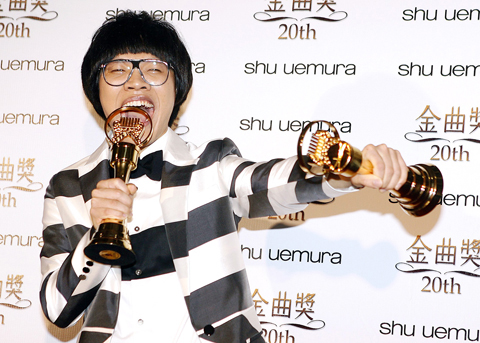Music stars gathered in Taipei yesterday to honor the industry’s top acts at the 20th Golden Melody Awards (金曲獎) ceremony.
Billed as the most important award in the Chinese-language music world — with entrants from Taiwan, China, Hong Kong, Singapore and elsewhere — the awards recognize achievements in 23 categories, including popular, traditional, classical, religious and Aboriginal music.
Taiwanese singer Crowd Lu (盧廣仲) was a double-winner, walking home with the Best Composer and the Best New Artist awards for his album 100 Ways of Life (一百種生活).

PHOTO: REUTERS
After winning the coveted Best Band category, A-hsin (阿信), lead singer of the Taiwanese pop band Mayday (五月天), said that “being beaten out repeatedly is the best practice for winning.”
The panel of judges, drawn from all fields in the music business, chose Weng Li-yong for (翁立友) the Best Taiwanese Male Singer award over veteran singers Shih Wen-bin (施文彬) and Chen Lei (陳雷). Huang Yi-ling (黃乙玲) won the best Taiwanese Female Singer.
Wu Yu-hsuan (巫宇軒) won the Best Lyrics award for the Taiwanese song Jia Ni Lan Lao Lao (甲你攬牢牢), while Judy Chiang’s (江蕙) album of the same name won the Best Taiwanese Album award.
The Nanwan Sisters (南王姐妹花), a trio of Puyuma (卑南) singers from Taitung, took top honors in both the Best Aboriginal Album and Best Music Group categories for their eponymous album.
Atayal singer Inka Mbing’s album Gaga won her the Best Aboriginal Singer award.
Hakka singer Liu Shao-hsi (劉劭希), who has picked up three Golden Melody Awards in past years, won this year’s Best Hakka Singer category.
The Best Hakka Album went to Rice & Love (愛吃飯), which included musical elements from folk, bossa nova, mountain songs of Hakka people and traditional songs of the Amis tribe to present the beauty of a simple life and a love of the land.
ADDITIONAL REPORTING BY AP

INVESTIGATION: The case is the latest instance of a DPP figure being implicated in an espionage network accused of allegedly leaking information to Chinese intelligence Democratic Progressive Party (DPP) member Ho Jen-chieh (何仁傑) was detained and held incommunicado yesterday on suspicion of spying for China during his tenure as assistant to then-minister of foreign affairs Joseph Wu (吳釗燮). The Taipei District Prosecutors’ Office said Ho was implicated during its investigation into alleged spying activities by former Presidential Office consultant Wu Shang-yu (吳尚雨). Prosecutors said there is reason to believe Ho breached the National Security Act (國家安全法) by leaking classified Ministry of Foreign Affairs information to Chinese intelligence. Following interrogation, prosecutors petitioned the Taipei District Court to detain Ho, citing concerns over potential collusion or tampering of evidence. The

Seventy percent of middle and elementary schools now conduct English classes entirely in English, the Ministry of Education said, as it encourages schools nationwide to adopt this practice Minister of Education (MOE) Cheng Ying-yao (鄭英耀) is scheduled to present a report on the government’s bilingual education policy to the Legislative Yuan’s Education and Culture Committee today. The report would outline strategies aimed at expanding access to education, reducing regional disparities and improving talent cultivation. Implementation of bilingual education policies has varied across local governments, occasionally drawing public criticism. For example, some schools have required teachers of non-English subjects to pass English proficiency

‘FORM OF PROTEST’: The German Institute Taipei said it was ‘shocked’ to see Nazi symbolism used in connection with political aims as it condemned the incident Sung Chien-liang (宋建樑), who led efforts to recall Democratic Progressive Party (DPP) Legislator Lee Kun-cheng (李坤城), was released on bail of NT$80,000 yesterday amid an outcry over a Nazi armband he wore to questioning the night before. Sung arrived at the New Taipei City District Prosecutors’ Office for questioning in a recall petition forgery case on Tuesday night wearing a red armband bearing a swastika, carrying a copy of Adolf Hitler’s Mein Kampf and giving a Nazi salute. Sung left the building at 1:15am without the armband and apparently covering the book with a coat. This is a serious international scandal and Chinese

NEGOTIATIONS: The US response to the countermeasures and plans Taiwan presented has been positive, including boosting procurement and investment, the president said Taiwan is included in the first group for trade negotiations with the US, President William Lai (賴清德) said yesterday, as he seeks to shield Taiwanese exporters from a 32 percent tariff. In Washington, US Trade Representative Jamieson Greer said in an interview on Fox News on Thursday that he would speak to his Taiwanese and Israeli counterparts yesterday about tariffs after holding a long discussion with the Vietnamese earlier. US President Donald Trump on Wednesday postponed punishing levies on multiple trade partners, including Taiwan, for three months after trillions of US dollars were wiped off global markets. He has maintained a 10 percent